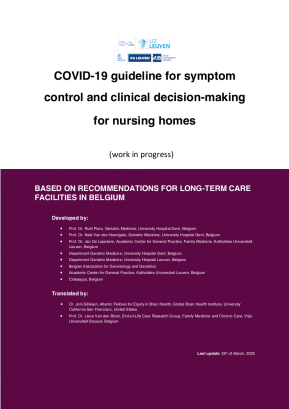Developed by: Piers R et al
Date: 02-04-2020
Developed by:
• Prof. Dr. Ruth Piers, Geriatric Medicine, University Hospital Gent, Belgium
• Prof. Dr. Nele Van den Noortgate, Geriatric Medicine, University Hospital Gent, Belgium
• Prof. Dr. Jan De Lepeleire, Academic Center for General Practice, Family Medicine, Katholieke Universiteit, Leuven, Belgium
• Department Geriatric Medicine, University Hospital Gent, Belgium
• Department Geriatric Medicine, University Hospital Leuven, Belgium
• Belgian Association for Gerontology and Geriatrics
• Academic Center for General Practice, Katholieke Universiteit Leuven, Belgium
• Crataegus, Belgium
Translated by:
• Dr. Joni Gilissen, Atlantic Fellows for Equity in Brain Health, Global Brain Health Institute, University
California San Francisco, United States
• Prof. Dr. Lieve Van den Block, E
The COVID-19 pandemic presents major challenges. In Belgium, geriatricians and representatives from the Department Geriatric Medicine, University Hospital Gent and Leuven, The Belgian Association for Gerontology and Geriatrics, the Academic Center for General Practice, Katholieke Universiteit Leuven and Crataegus, Belgium have developed a COVID-19 guideline with regards to symptom management and clinical decision-making for nursing homes, which has been translated to English for wider dissemination. It includes four appendices: 1) Treating and controlling the most important COVID symptoms; 2) Ethics concerning proportionality of critical care during COVID-19; 3) The Clinical Frailty Scale (CFS); and 4) A decision tree for hospital admissions.
The developers hope that this instrument can serve as a helpful tool to provide each older adult in your facility, with appropriate and high-quality care in the most appropriate setting. The guideline might provide support to healthcare professionals working in long-term care facilities in making a risk-benefit analysis for nursing home residents in case there are decisions to be made about whether or not to hospitalize the resident - taking into account current ethical recommendations. The guideline also includes assistance to evaluate and treat important symptoms in this older population specifically.
In the guideline, it has been recommended to proactively evaluate nursing homes residents using the Clinical Frailty Scale (CFS); taking into account that that this scale was originally designed to measure severity of frailty after a comprehensive geriatric assessment and usually cannot take only 1 minute (https://www.bgs.org.uk/resources/recognising-frailty). However, it can provide guidance in decision-making in urgent and critical situations.
Unnecessary transfers are a risk for healthcare providers of transport services and emergency admissions. Attention for advance care planning can be very helpful in these circumstances. For nursing home residents who have a score of CFS 7 or more, and who were not yet involved in advance care planning and have not yet articulated or put into writing their wishes and preferences regarding care, this guideline proposes to contact the family, geriatrician and involved physician, if in doubt.
The guideline will be continuously updated as new evidence, guidelines and measures come along.

